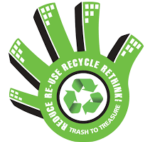

These activities relate to ensuring that the necessary projects are implemented to ensure prevention, and minimisation of waste, as well as to divert waste from landfills through tackling all waste streams, generated within the City of Johannesburg. Re-use, recycling and recovery activities are prioritised, and the necessary infrastructure to support these initiatives developed. The projects included are; separation at source rollout, with a view to making this mandatory, building buy -back centres and garden refuse sites, developing a business case for dealing with green waste and composting as well as addressing the operations and viability of the incinerator. There is an acknowledgement that some of the interventions require technological solutions, therefore collaboration with the private sector is key.
The programme also recognises the role of waste reclaimers in the process, and relevant interventions are included to build partnerships with reclaimers, and recyclers in the roll out of separation at source.
In order to address waste prevention as well as the minimisation of waste, there is a need to create value from waste, throughout the value chain.
Incentives and disincentives should be used to ensure that minimal waste is generated, but also that there is an incentive to recycle and extract valuable waste from the waste stream, that may then be used as productive resources in other processes.
Pikitup will make a contribution by ensuring that a recycling economy is established in the City of Johannesburg, where communities and entrepreneurs, will be able to manage and benefit from recycling activities, and waste may be used as a resource to produce various products. At the centre of this intervention is the establishment, and facilitation of various co-operatives to participate in recycling activities, cleaning of areas as well as addressing illegal dumping in communities.
Whilst implementing projects to enhance waste prevention and minimisation, waste removal services will be provided in an efficient manne,r and service levels improved. A clean City of Johannesburg builds investor confidence, and improves the health and quality of life of its citizens. Various initiatives in the 2015/16 financial year, are aimed at improved cleanliness levels in the inner city, outer city, hostels and informal settlements. Specific attention is also paid to measures to address illegal dumping.
The implementation of the Jozi@Work programme, will be included in the service delivery approach. The approach entails appointment of community based contractors, and co-operatives to take responsibility for collecting and managing waste, including in informal settlements, street cleaning and illegal dumping.
Behavioural change in the home and in the workplace, is key to the success of waste prevention and minimisation, and therefore significant resources will be allocated to developing partnership, and involving stakeholders in education and awareness programmes. Education and awareness creation in communities, is also critical to address matters of illegal dumping, as well as more effective law enforcement. It is acknowledged that Pikitup cannot achieve these goals by itself, and therefore requires partnerships and participation from various stakeholders.
Customer centric services and processes are required to drive a highly efficient and effective business organisation, operating in the logistics space. In order to achieve this goal various supporting processes, systems and structures should be in place. These relate to:
• Economic and financial analysis
• Evidence based planning
• Operations management
• Best practice financial and human resource management
• Appropriate policies and internal controls
• Effective management of risks
• Building a skilled work force aligned to the needs of the company
• Productivity improvement measures
• External and internal communication plans
Pikitup is committed to continually improving its performance, and the company is confident that it will, through partnerships and stakeholder involvement, attain the vision; “to be the leading integrated waste management company in Africa, and be considered amongst the best in the World.”
Strategic Framework and Context
The Polokwane Declaration signed in September 2001, committed South Africa to achieving 50% reduction in the volume of waste generated, and 25% reduction in volumes of land-filled waste by 2012, and a zero waste plan by 2022. The Polokwane Declaration was a call to action, and since its adoption in 2001, the National Waste Management Act and the National Waste Management Strategy, were adopted in 2011. The National Waste Management Strategy provides the strategy, and action plans to deliver on the mandate to reduce waste to landfills.
The National Waste Management Strategy shifts the focus of waste management away from disposal of waste, to avoidance, reduction, re-use and recycling, before handling and final disposal. The strategy applies the principles of accountability, cradle to grave responsibility, equity, integration, waste avoidance and minimisation, in its action plans which aim to move away from fragmented and uncoordinated waste management, to integrated waste management.